Mary Ann HAWKINS
Relationship to me: 2nd Cousin 2x removed
WARNING: This page recounts intimate partner violence which may be distressing.
Mary Ann was born on February 24th, 1856, in Coleford, Gloucestershire, in the Forest of Dean. She was the great-granddaughter of Thomas HAWKINS and Mary Ann ROBERTS, my 4th great-grandparents. Mary immigrated to New Zealand in April 1876 onboard the “Camperdown“, travelling with her great uncle and aunt, Thomas and Ellen MILES (my third great-grandparents), their three children (Anna, Lucy, and Howard), and Alfred BENNETT. Alfred later married Lucy and they lived in Southland together. The Camperdown arrived in Nelson on July 4th, 1876.
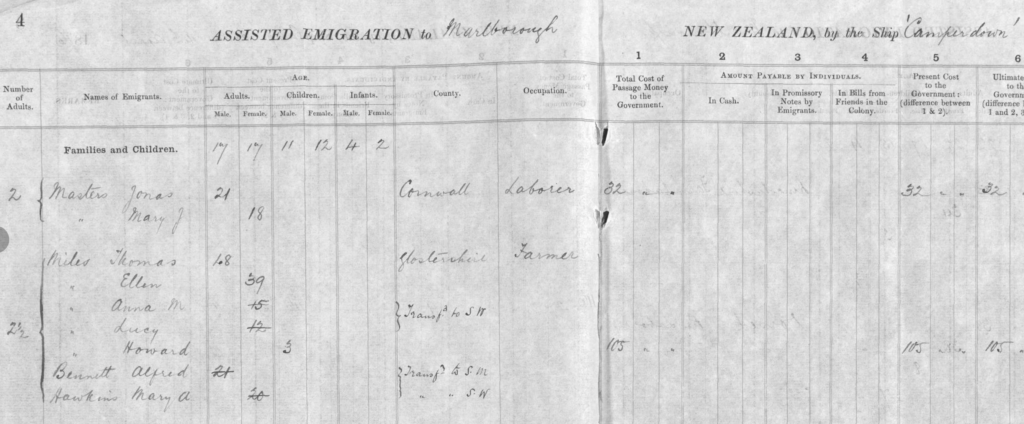
Mary married Daniel SWAN the year after her arrival in New Zealand, on April 17th, 1877, in St. Mark’s Church, Opawa, Christchurch. Daniel arrived in New Zealand in 1874 aboard the “Atrato“, travelling with his brother Stephen.

Over the next 19 years, Mary gave birth to 11 children. The first eight children were born in Christchurch, while the younger ones were born in Melbourne. It is not clear when and why Mary and Daniel went to Australia. All we know is that they had their first child in Melbourne in 1890, and by 1897 were back in New Zealand, now living in Invercargill.
In 1893, their third child, Edith Alice SWAN was involved in a near-drowning while the family were living in Brunswick, Melbourne.
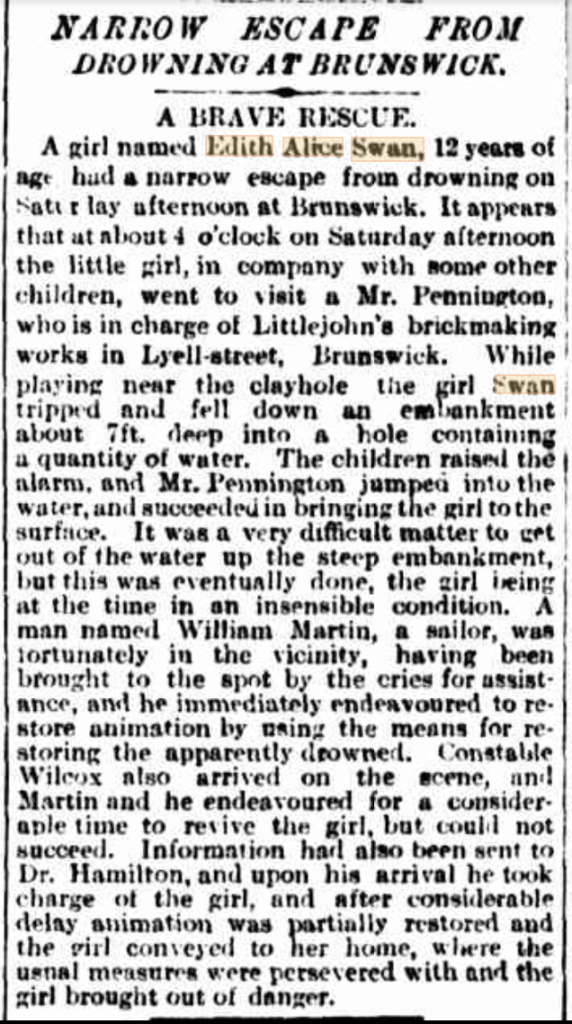
Three years later, the second youngest child, Edward Nathaniel Swan, died at the age of 17 months on January 29th of gastroenteritis and “asthenia” (weakness) at the family home at 74 Lyle Street, Brunswick. Just two weeks later, little Edith died in the Homeopathic Hospital in Melbourne at the age of 12 years, on February 12th, 1896 of “febrio enterica” and peritonitis. It is unclear what Edward and Edith’s causes of death related to, although it is likely it was fever (febrio) caused by a gastrointestinal illness, so both children may have died of food poisoning.


It is possible that these deaths prompted her parent’s decision to return to New Zealand. By November 1897, the family had returned to New Zealand when the family sought damages against a cyclist who knocked their youngest daughter, Rhoda, over and Rhoda sustained injuries to her teeth and face. In 1898, Daniel was charged and convicted of aggravated assault against Mary and sentenced to one month’s imprisonment.
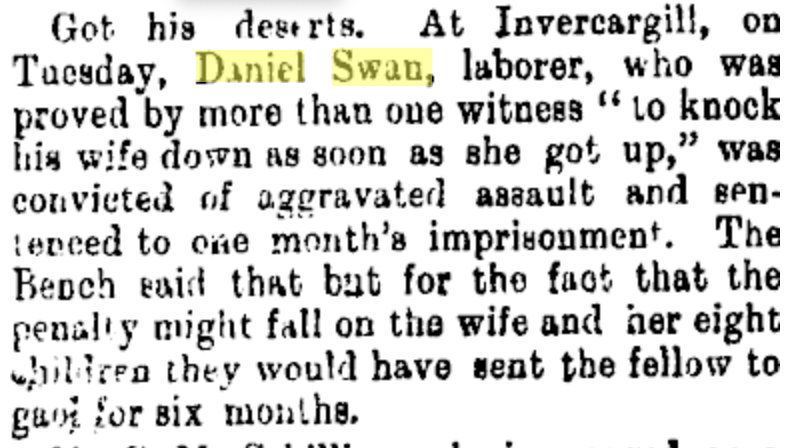
A few months later, Daniel applied to be relieved of a ditching contract he had with the Invercargill abattoir due to ill health and “family troubles”.

Just a few days later, Daniel was sentenced to a month’s imprisonment for assault. It is unclear if this relates to the court case in December, or another incidence of assault.

By 1901, Mary and the children had left Daniel due to his ongoing drunkenness and violence and had applied to the Court for Daniel to pay maintenance for herself and the children.
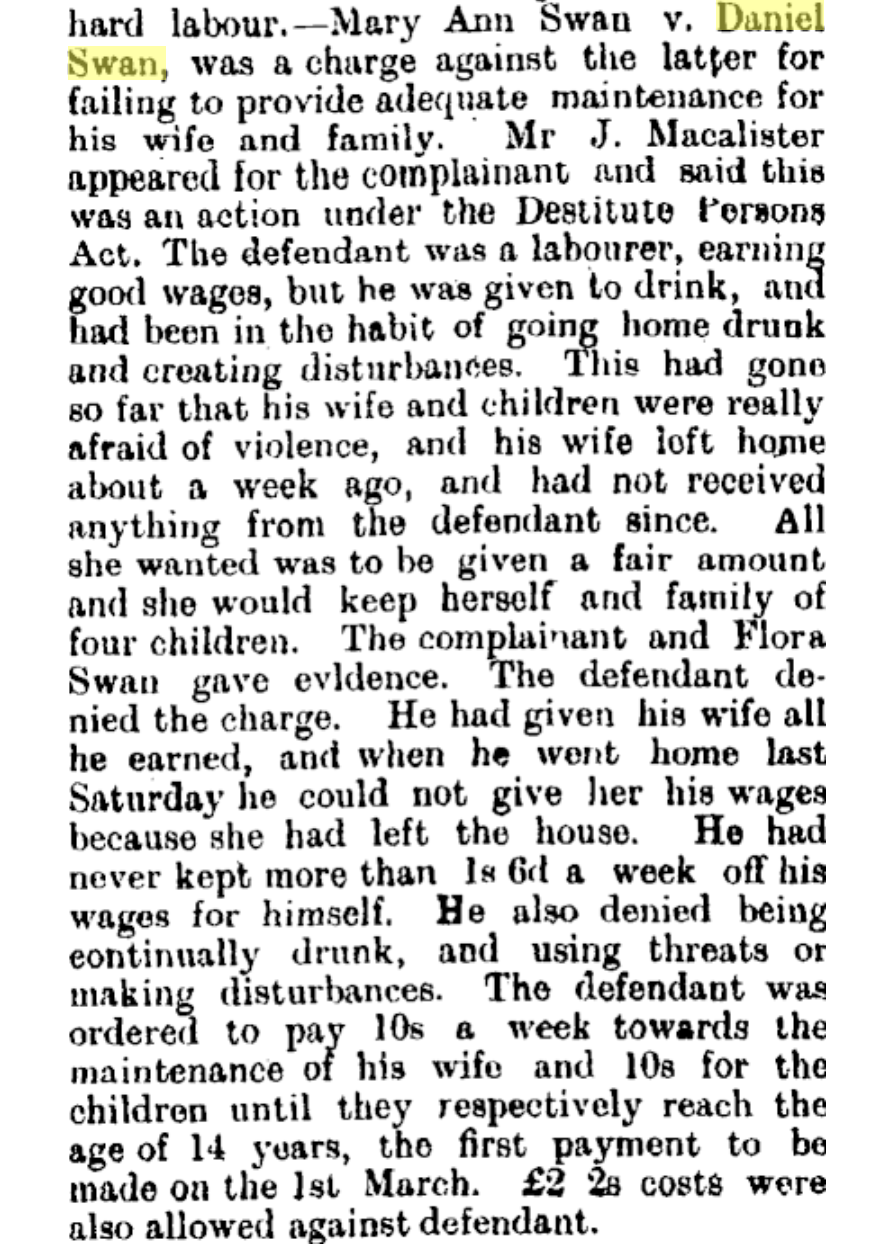
Just a few months later, Daniel again found himself in Court, charged with assault Jeremiah O’Regan, a labourer from Orepuki.


By 1904, it seems that Mary was still being subjected to violence by Daniel. Daniel was charged with using indecent language in a domestic dispute with the newspaper article mentioning that Mary had obtained a separation order. We know from subsequent reports that Mary had separated from Daniel by this time, but had allowed him to remain in the family home as a boarder to ensure we had a home to live in.
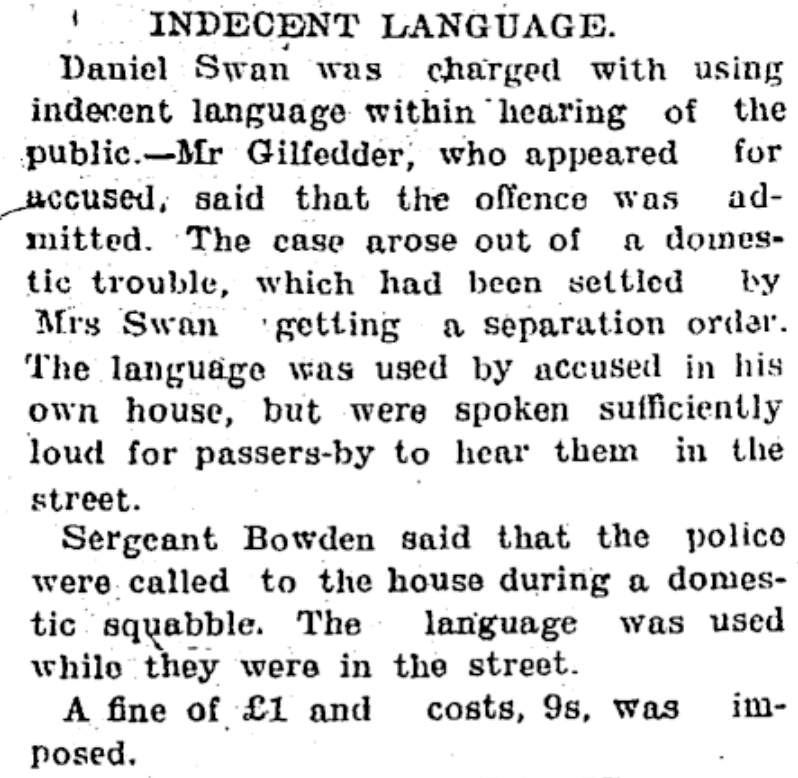
On June 28th, 1905, Daniel attacked Mary in the family home and killed her.
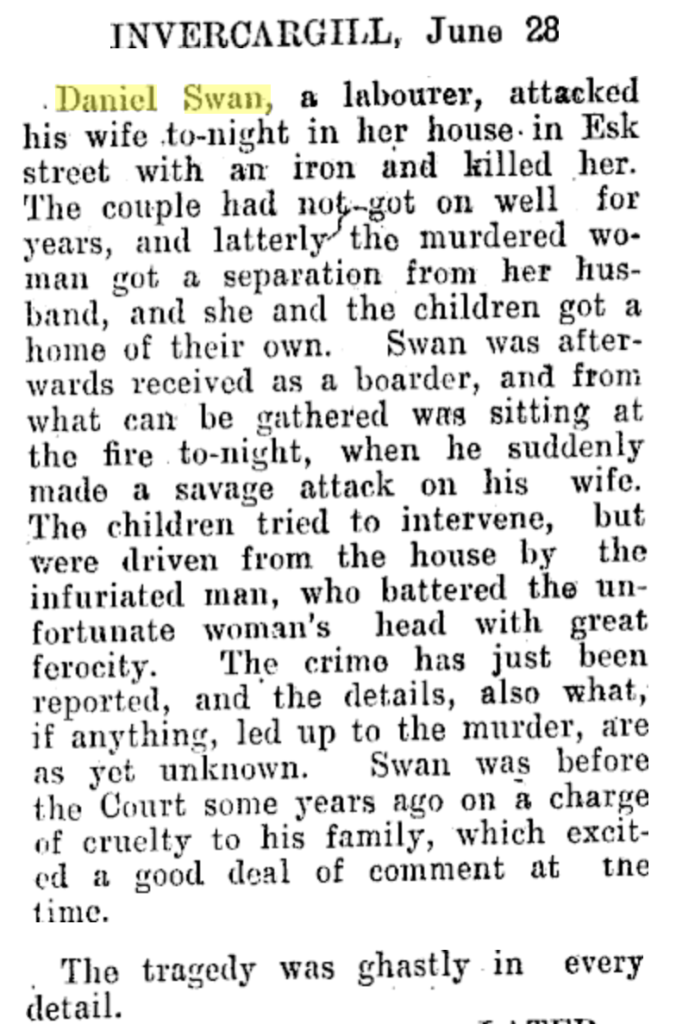
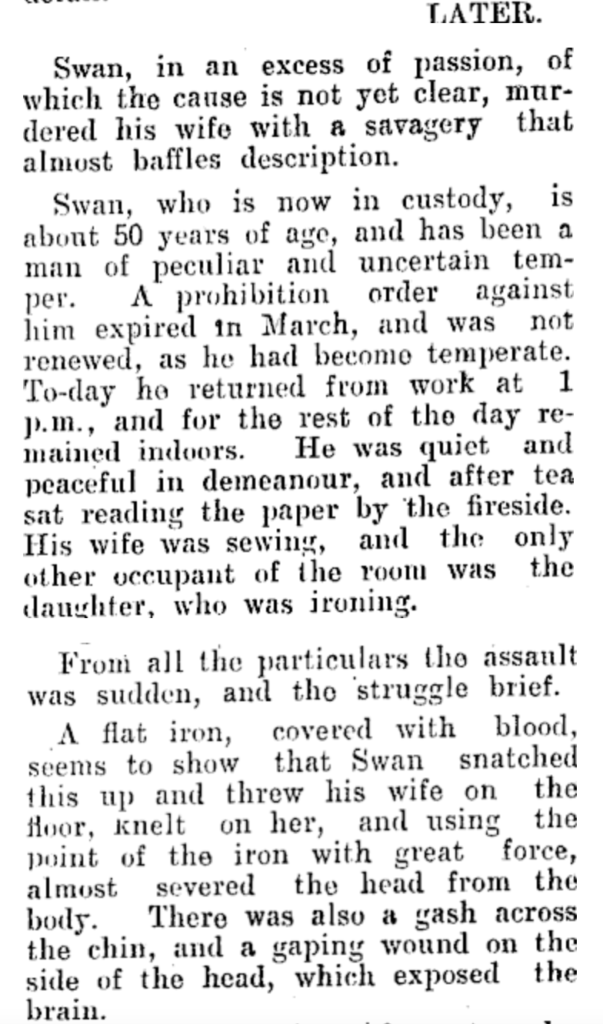
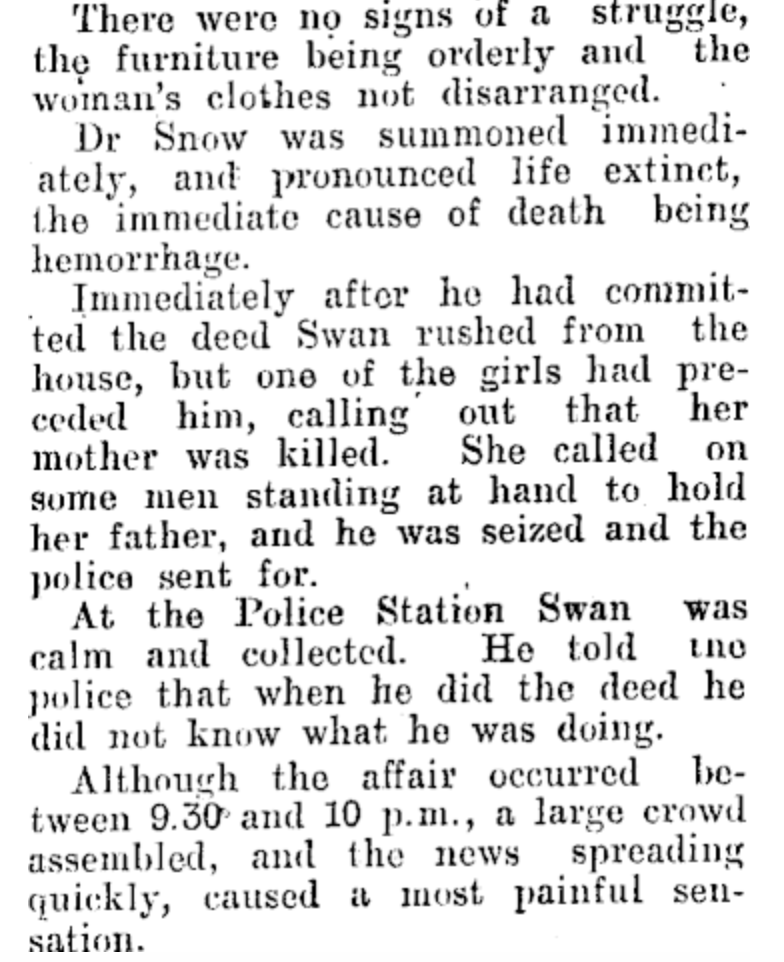
GREYMOUTH EVENING STAR, 29 JUNE 1905, PAGE 4
Following a Coroner’s enquiry, a verdict of “wilful murder” was brought against Daniel.
At the coroner’s inquiry into the Esk street tragedy (says the Southland Times of the Ist inst,) the evidence of Rhoda Swan was given under most pathetic circumstances. Owing to the injuries she received while endeavoring to protect her mother, she has been an inmate of the hospital since Wednesday night. She was brought into her room in an invalid’s chair, her head and both hands bandaged. She is a most intelligent looking little girl, and the jury came to the unanimous opinion that she was a heroine as well. When she first heard the word “mother” mentioned, she commenced sobbing in a most affecting manner, but on her recovery she gave her evidence clearly and intelligently. One particularly touching episode she related with childlike simplicity. After her father had accomplished bis deadly purpose and had run into the street, she knelt beside and kissed her dead mother, whose blood stained her lips. The accused, Daniel Swan, appeared to fully realise his position. During the morning sitting he frequently broke in upon the proceedings with groans, and his breathing was heavy and strained. At the afternoon sitting his manner changed visibly. He listened attentively to the evidence, and on one occasion, during the temporary absence of his counsel, cross-examined the witnesses. The jury’s verdict was wilful murder against Daniel Swan.
MANAWATU TIMES, VOLUME XXVIII, ISSUE 422, 7 JULY 1905, PAGE 2
Further evidence, including witness accounts, were heard at the inquest.
The Esk street Tragedy.
THE INQUEST. A DEVOTED DAUGHTER. VERDICT OF WILFUL MURDER. A brief account of the murder of Mrs Swan by her husband, Daniel Swan, was given in last week’s issue. In connection with it we have been informed that about 9.55 on Wednesday night Mr George Kingsland, Mr W. Ronald (who is engaged in Messrs J. Kingsland and Sons’ Red Boot establishment) and Mr H. Sims entered the right-of-way from Esk street to Tay street on the west side of Swan’s house. ‘ It was a dark, foggy night,’ said Mr Kingsland. ‘As we reached the end of the house we heard a noise as though furniture was being knocked about, and then a girl in the house screamed out — ‘He is murdering mother.’ We rushed back into Esk street, and a man whom we took to be Swan came out of the front door and went towards Dee street, followed by a boy who was striking the man on the back with what looked like a stick, but which afterwards turned out to be the handle of a bicycle pump. The boy cried out—‘Catch him—he has murdered mother.’ With that we gave chase, and Ronald was the first to get hold of the man. I said — ‘Stick to him, Bill, and I will go back and see what is the trouble.’ On the way back I met a little girl, and asked her what was wrong. She replied —‘ Come in and see, Mr—he has murdered mother.’ I then entered the house, and went along the passage, which was in darkness. I looked round the door of the sittingroom, which was dimly lighted, and saw a woman lying on the floor with her head towards the fireplace in a pool of blood, with a wound in her throat. I ran back to Ronald and told him it was a case of murder. I asked some of the people who had by this time gathered in the street if the police had been sent for, and was told that they had, and I then went to the Fire Brigade station and rang up for a doctor. The attendant asked what doctor, and I said any one, and they put me on to Dr Snow. I then returned to where Ronald and others had charge of Swan, and after waiting a little went to the Police Station, where I saw Mr Lane of the Times Office, Mr Clark, and the little girl. Mr Lane was telling Constable Holmes about the case. On the way back I met Mr J. McGregor, of the American Carriage Factory, and when we reached the Fire Brigade Station we asked a fireman to ring up Jopps’ stable for the ambulance waggon. The whole thing must have happened very quickly, for not more than a minute or two seemed to elapse from the time we first heard the noise till I entered the house.’
The inquest was held at the Hospital on Friday, 30ch June, before the Coroner, Mr S, E. McCarthy. Inspector Mitchell conducted the proceedings for the police, and Mr Gilfedder appeared for Daniel Swan, who was present in custody.
Dr Snow described the results of his examination of the deceased, and Drs Ewart and Barclay stated as the result of interviews with Swan that he appeared to be quite rational. When asked by Dr Barclay if he were sorry for what happened he replied —‘ Sorry is no name for it, sir. That man Clark is trying to take my wife from me, and trying to put my children against me.’
Rhoda Swan, aged 13, who was wheeled into the room in an invalid’s chair, and whose head and hands were bandaged, described the scene which ended in her mother’s death. The girl stated that she tried to keep her father back, and in the struggle he broke one of her fingers, and struck her on the other hand and the head with the iron. Before witness ran out of the room she stooped and kissed her mother, who was lying near the fireplace, and never moved. As soon as the boarder Clark saw her mother on the floor he ran out for the police.
Flora Swan, aged 17, told how she went from the dining room to her mother’s bed room, and five minutes later heard a scuffle in the diningroom, and when she got back her father and Rhoda were struggling together. Witness pushed her father back from Rhoda, and then left the room, intending to go for the police, but changed her mind, and returned, when she saw Rhoda and her brother Daniel struggling with her father. Witness picked the lamp up and was going out when Clark came in, followed her into the kitchen, and then left for the police. Witness never saw anything to make her think that her mother was fond of Clark. Her mother was 48 years of age, was kind to her children, and was a goodtempered woman. Had never heard her father complain that her mother showed more attention to Clark than to him. Her mother had obtained separation and prohibition orders against her father some time ago, but had agreed to let him live in the house as a boarder, as he said he would have to go into the Old Men’s Home otherwise.
Evidence was also given by Daniel Swan, aged 15 years, Elizabeth Matilda King, James Clark (who stated that Swan had never complained about his being too familiar with his wife, nor had he any reason to do so), Constables Holmes and Reidie, and Ralph Swan, eldest son of the deceased. Constable Holmes stated that when he charged Swan with the murder of his wife he said that he loved her with his whole heart and soul, and that Jim Clark was the cause of the trouble. A number of the witnesses stated that they never saw or heard of anything wrong between Clark and the deceased.
The jury returned the following finding :— ‘That the deceased, Mary Ann Swan, met her death at the hands of her husband, Daniel Swan, on Wednesday, 28th June, and the jury therefore return a verdict of wilful murder against Daniel Swan. It is the opinion of the jury that there is not the slightest evidence to show that the accused had any cause for jealousy. The jury also expresses its high appreciation of the noble courage displayed by Rhoda Swan in trying to protect her mother.’
The funeral of the late Mrs Swan took place on Saturday, Ist July, the remains being interred in St. John’s cemetery The Ven. Archdeacon Stocker conducted the service.
The house in which the tragedy occurred is now empty, the last of the furniture having been removed on Tuesday.
The hearing of the charge against Daniel Swan will be opened in the Police Court on Monday.
SOUTHERN CROSS, VOLUME 13, ISSUE 15, 8 JULY 1905, PAGE 12
The trial against Daniel ran from August through to September, 1905. During the trial, one of Daniel’s sons testified that Daniel’s head “was penetrated by a stone some years ago, and it was supposed to be still embedded in his head, as it would at times swell over the seat of the injury.” Other siblings also gave evidence for the prosecution. Ralph Swan, who was 25 years old, told the Court that his father had been violent towards his mother on several occasions after drinking and that when Daniel suffered with rheumatism he became “flushed”. Ralph also testified that Daniel had struck him at least none years prior when the family were living in Australia. On that occasion, Ralph had gone walking with his brothers and Daniel believed he had prevented them from attending church, which resulted in Daniel striking him so violently that Ralph could not put on his coat and had to be fed with a spoon. Ralph described his father at that time as a fervently religious Baptist. Horace, another son, described an argument that took place in Australia where Daniel threatened Mary in the bedroom, and he was heard to say, “Lie down you bitch, or I’ll kill you”. Ralph testified that his father seemed very fond of Mary but would become violent when the “bad fits came upon him” and that Daniel’s belief that Mary and James Clark were having an affair was a delusion. Horace also noted that Daniel was fervently religious and believed he may have religious mania at one time.
After Daniel was arrested, he said to the police, “God knows, I did not intend to kill my wife. It was Clark I wanted. That dirty dog Clark pretends to court my daughter, and all the time he is meddling with my wife.” James Clark was another boarder to lived at Mary’s home. Daniel was found guilty of wilful murder and sentenced to death.
In 1906, the Southland Times newspaper established a fund referred to as the “Rhoda Swan Testimonial” for Rhoda who so valiantly tried to protect her mother. The community raised £82 13s 6d and it was held in trust for when Rhoda came of age.
A petition was subsequently lodged for Daniel’s sentence to be commuted to life due to his not being of right mind when he committed murder. This was approved and Daniel spent the next 15 years in jail. In 1919, he was released on probationary licence and returned to Australia where he died on October 28th, 1938 (cause of death was senile degeneration for 12 months) at the Melbourne Benevolent Asylum in Moorabbin.
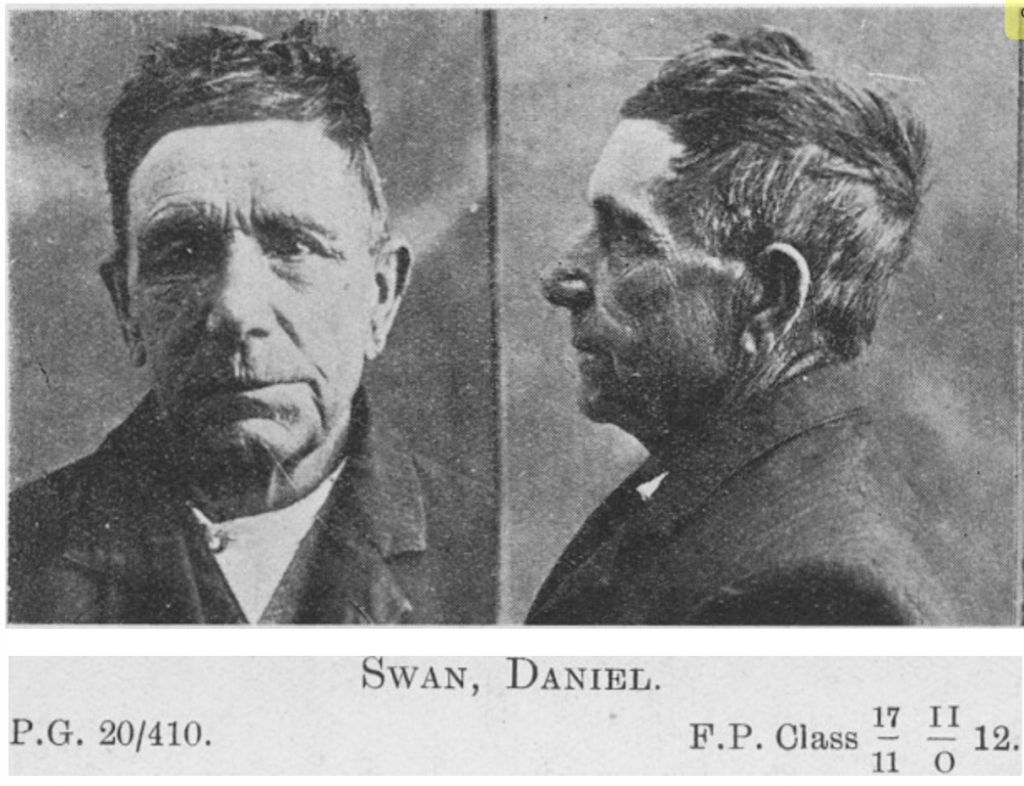
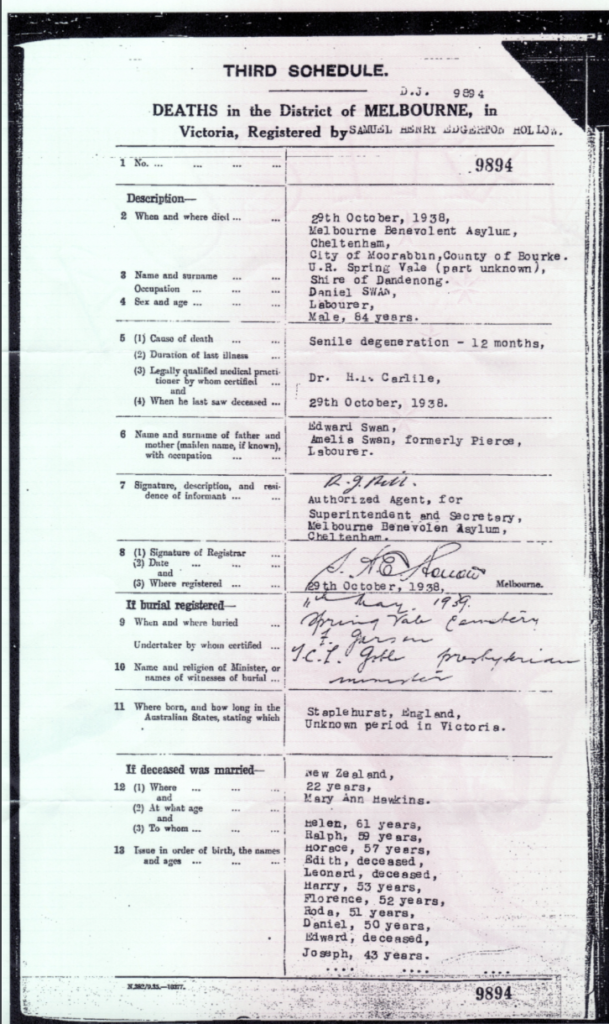
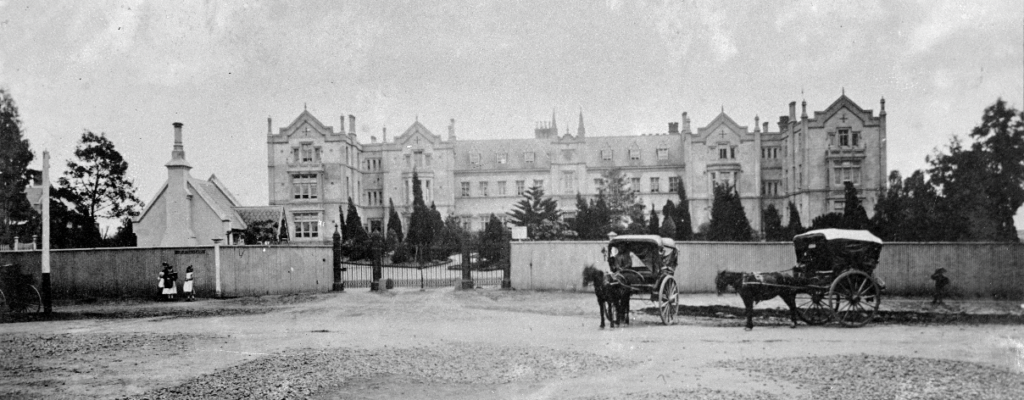
At the time of Mary’s death, eight of her 11 children were still living. In searching for information on Mary’s children and what happened to them after her murder, I was able to locate information on Rhoda. In 1911, she appears in the Police Gazettes having been arrested for theft but was subsequently discharged. Rhoda subsequently married in 1919 and lived until 1976. Horace worked as a miner in Denniston and was arrested for playing two-up in 1928. Flora went on to marry John Cornelius CLARK in 1908 (the man who Daniel had accused as having an affair with Mary).
Sources
Edith’s near-drowning in 1893: https://trove.nla.gov.au/newspaper/article/8699350?searchTerm=brunswick%20swan
Daniel’s conviction for assault in 1899: https://paperspast.natlib.govt.nz/periodicals/NZPG18990214.2.12
Daniel’s acquittal for assault on Jeremiah O’Regan in 1901: https://paperspast.natlib.govt.nz/periodicals/NZPG19010717.2.12
Son’s testimony about Daniel’s head injury: https://paperspast.natlib.govt.nz/newspapers/TH19050711.2.21
Extensive information of witness statements during Daniel’s court case: https://paperspast.natlib.govt.nz/newspapers/OW19050906.2.79